The College of William & Mary, America’s second-oldest college (after Harvard), whose graduates include two U.S. presidents and 16 signers of the Declaration of Independence, is one of several academically superior schools of higher education in Virginia. But William & Mary, chartered in 1693 by Britain’s King William III and Queen Mary II, is also the butt of some good-natured jokes, as I’ll explain. Most have to do with athletics.
One longstanding gag involves the lame concept that when an opponent faces this school, even if it defeats William, it still has Mary to deal with.
But the latest ripples of laughter relate to the school’s search for a sports mascot. This requires considerable background before I tell you what’s so all-fire funny, as my mother used to say.
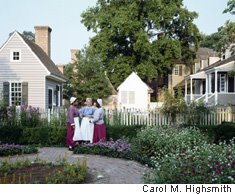 |
| Williamsburg, home of The College of William & Mary, was Virginia’s colonial capital |
In 1916, this college in Williamsburg, Virginia, adopted the nickname “Indians” for its basketball team. This made a bit of sense back then, since part of the college’s mandate when it was founded was to educate some of the area’s native peoples, who would then propagate the Christian faith “amongst the Western Indians, to the Glory of Almighty God.”
If “any great [Indian] nation will send 3 or 4 of their children thither” to the college, Virginia’s royal governor proclaimed, they could be trained in British ways, then “sent back to teach the same things to their own people.”
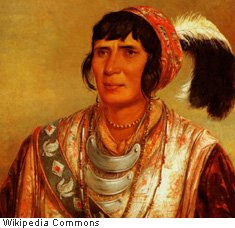 |
| This is George Catlin’s painting of War Chief Osceola, who fought against intruding whites in the Seminole Wars in Florida in the early 1800s |
The “Indians” nickname hung around until the 1980s. That’s when the NCAA — the National Collegiate Athletic Association — which governs intercollegiate sports, began pressuring schools to eliminate “hostile and abusive” racist stereotypes of Native Americans in their team nicknames and mascots. Faux tomahawk chops, phony war whoops, painting faces to look like “braves on the warpath,” gyrating “pow-wow” dances, and fiery spears hurled from an “Indian pony” onto a football field — all by whites dressed as “redmen” — were deemed to be far too reminiscent of the days when many Americans openly scoffed that “the only good Indian is a dead Indian.”
In the NCAA’s view, “Warriors,” “Chiefs,” “Redmen,” and “Braves” nicknames weren’t any better. St. Bonaventure College in New York State had even called its teams the “Brown Indians” and “Brown Squaws” until 1979.
 |
| And this is the white mascot’s interpretation of Osceola at a Florida State University football game |
Fans of schools with various versions of Indian nicknames pointed out that even the United States Army uses Indian names (Comanche, Blackhawk) for its helicopters. Chrysler makes Jeep Cherokees and Dodge Dakotas. The U.S. Government even picked an
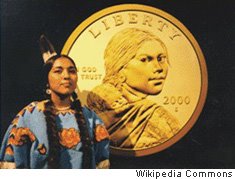 |
| Randy’L He-dow Teton, a Shoshone like Sacagawea, was the model for the new U.S. dollar coin, issued in 2000 |
American Indian, the Shoshone Sacagawea, for its new dollar coin. And if Indian derivatives are offensive, shouldn’t we, logically, change Indian-based city names like “Miami” and “Chicago,” and state names like “Iowa” and “Arkansas”?
Universities protested that their Indian nicknames and mascots evoked strong, positive images of proud native peoples. Right, responded reformers. How do you think other minorities would have reacted to nicknames like the “Mighty Negroes,” “Fightin’ Brownskins,” “Battling Beaneaters,” or “Chinamen”?
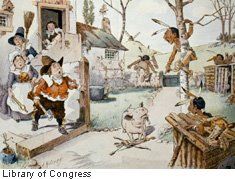 |
| This Thanksgiving caricature, created about 1902, carried a caption: “Two marvels. “Look!” “Ay, a strange sight! Redskins having conniption fits and a hog interested in something he can’t eat!” |
“American Indians are a race of people,” not animals (Wolves), objects (Rockets), or professions (Cowboys) from which most teams choose a nickname or mascot, John Two-Hawks writes on his “Native Circle” Web site. “The terms ‘reds**n’ [he cannot bring himself to write the word “redskin”] and ‘brave’ are . . . racial slurs. ‘Reds**n’ is a historic word which came into use during the times when Indian men, women and children were hunted like animals and murdered, then scalped. These scalps or ‘redsk**s’ were then turned in for a bounty.”
“Indian children cannot possibly look at a stadium full of thousands of people mocking their ethnicity and making fun of their traditions and feel good about being Indian. . . . They glorify all the stupid old stereotypes and steal the pride our children could have in the beauty of their race. They insult the entire Indian race.”
The University of Illinois’ mascot was one that infuriated Two-Hawks and other American Indians. A young white guy dressed in full Sioux Indian regalia, including a feather headdress and fearsome war paint, he went by the name “Illiniwek.” The nickname of the university’s sports teams is “Fighting Illini,” after the Illini Indian Confederation that once ruled the Upper Mississippi Valley. Illiniwek was supposed to invoke their ferocious spirit.
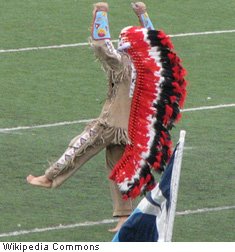 |
| “Chief” Illiniwek prances no more at University of Illinois sports events |
For years, the university’s administrators declined to retire Chief Illiniwek. After all, they said, a Sioux tribe sold them the mascot costume, so it can’t be that degrading. But last year, the university gave in and “retired” the dancing “chief.” A university spokeswoman told me, tersely, “We have no mascot and no plans to get one.”
Like Illinois, other colleges had taken their athletic team nicknames from tribes that are, or had been, prominent in the area, including Utes in Utah, Choctaws in Mississippi, and Chippewas in Michigan. One university, Southeastern Oklahoma — ironically based in a state that used to be America’s “Indian Territory,” where native peoples were banished to reservations against their will, called its teams the “Savages” for years before modifying it to “Savage Storm.”
“Savages,” of course, fits the old stereotype of Indians as wild and vicious — and more recently, drunken — barbarians.
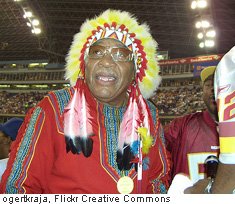 |
| “Chief Zee” is a Washington Redskin superfan who became famous by menacing a rabid Dallas Cowboy fan in a cowboy getup with his rubber tomahawk |
The NCAA had no clout over high-school teams, about 2,500 of which still carry one sort of “Indian” nickname or another. Nor can college administrators influence the professional National Football League, in which the Kansas City Chiefs and Washington Redskins refuse to even discuss a name change; or Major League Baseball, in which “Braves” and “Indians” still whoop it up — literally, if you listen to their fans.
The NCAA also concluded that it could not force individual colleges to drop their Indian-related nicknames, but it hounded and embarrassed many into doing so. At a time when many universities were struggling with accusations of racism over admission policies or sexism in the allocation of athletic resources (see last week’s Ted Landphair’s America called “IX at 37” in the archive to the right), some schools capitulated and changed their nicknames.
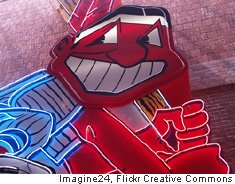 |
| Unlike pro teams like the Cleveland Indians with their longtime “Chief Wahoo” symbol, some colleges agreed to dump their Indian logos |
Many that were “Indians” or “Redmen” kept the “red” part: Red Wolves, Redhawks, Red Storm. Marquette University’s Warriors became Golden Eagles, and Stanford University’s Indians morphed into the Cardinal. Yup, just one Cardinal (it has to do with the reddish color, not the bird). The University of Louisiana-Monroe not only changed its team nickname from Indians to Warhawks, it also stopped referring to its campus as “the Reservation.”
Bradley University in Illinois dumped its Indian mascot, replacing him with a bobcat, but held tight to its “Braves” nickname. Indiana University in Pennsylvania clung to its “Indians” team names, too, but adopted an inoffensive brown bear as a new mascot.
Still, the NCAA kept tightening the screws. In 2005 it banned most schools with Indian-style nicknames from hosting tournament playoff games, which the national governing body controls. Colleges that had already scheduled tournament games would have to remove Indian imagery and mascots from the events.
Finally the NCAA had found a sanction with teeth, since colleges make a lot of money hosting these playoff games.
One of the colleges that has adamantly fought to keep its Indian nickname and logo is the University of North Dakota, which treasures its “Fighting Sioux” identification. The university’s excellent ice-hockey team had been one of the programs barred from hosting postseason play. “It is not at all obvious to us why the NCAA finds the nicknames Chippewas, Seminoles and Utes worthy of exceptions, but somehow Sioux is deemed hostile and abusive,” university president Charles Kupchella said at the time. Schools that were permitted to keep their Indian nicknames “have been exempted on the basis of a ‘special relationship’ with American Indian tribes,” Kupchella noted, “yet our proportionate number of American Indian students and the number of substantive programs in support of American Indian students exceeds that of all of the exempted schools combined.”
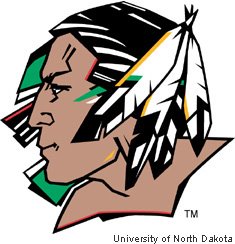 |
| The University of North Dakota has fought to hold onto its prized “Fighting Sioux” nickname and logo but will give in if the state’s two Sioux tribes don’t agree |
But this May, weary of the fight, the North Dakota Board of Higher Education agreed to relinquish the university’s nickname and logo next year, unless tribal councils of the state’s two Sioux tribes agree by October 1 to let the university keep, for 30 years, the “Fighting Sioux” nickname and its logo of an American Indian man with feathers and streaks of face paint. As the calendar pages keep turning, tribal leaders are sending mixed messages about their final positions on the matter.
The Grand Forks Herald in the university’s hometown has concluded that it’s time to give up the fight. “No, the use of the nickname and logo were not intended to offend anyone,” it wrote in January. “But offense is in the eye of the offended, and offenders often overlook that.
“What’s more, the Sioux have a right to claim their name, and they
have forcefully argued that UND does not.”
All this is a long prelude to the William & Mary story in Virginia, two-thirds of a continent away. It underscores the sensitivity of college nicknames and mascots, most of which were originally chosen for the fun of it, with little regard for hurt feelings that they might cause. On campuses that were then often 100 percent white, there were no hurt feelings.
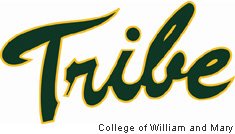 |
| William & Mary has replaced its old “Indians” nickname with the somewhat more nebulous “Tribe.” It plans to keep it, even when it gets a new mascot |
At William & Mary, which from the mid-1960s until the mid-‘70s had displayed a stupidly grinning Indian logo similar to the Cleveland Indians baseball team’s “Chief Wahoo,” officials first tried to accede to the anti-“Indian” mascot wave by softening the nickname to “Tribe.” They even adopted a fuzzy blob of a mascot in a colonial costume called “Colonel Ebirt.” Ebirt is “Tribe” spelled backward. After the NCAA ruled that the university could keep “Tribe” but would have
 |
| The old logo, with feathers |
to revamp or discard the school logo — a “WM” with two Indian feathers — the university kept the image, erased the feathers, and set up an elaborate “new media” search for a new mascot, soliciting suggestions on Twitter, Facebook, and the like.
The selection will be difficult. How do you capture in one name or image a complex, academically astute liberal-arts college in a way that excites students and alumni? People across America, who have any association with Virginia Tech, down the road from William & Mary, for instance, call each other “Hokies.” Lots of folks here at VOA refer to each other as “Terps,” too. It’s short for “Terrapins,” the sports teams’ nickname at the nearby University of Maryland.
Will some of the names suggested for William & Mary, such as “Phoenix” (as in rising from the ashes), convey the same bond? Somehow I can’t see two old William & Mary grads calling each other “Phoenixes.”
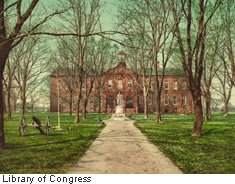 |
| William & Mary’s Christopher Wren Building is depicted in an early color postcard |
The wren, a warbly little bird, is getting some consideration, since Wren Hall — the nation’s oldest college building, named for the British architect Sir Christopher Wren — is prominent on campus.
But — and here, at last, comes the humor that I promised — of the more than 500 mascot nominations submitted so far, one that’s drawing critical bemusement, even some outright acclaim, is an asparagus stalk!
Oh, those mirthful students and alumni. A lot of people are rooting for the Asparagus, which, of course, would need a name.
Gaspar the Asparagus?
 |
| What do you think? Is this mascot material?? |
“Nothing says ‘Alma Mater of a Nation’ like a stalk of asparagus,” Ed Miller of the Virginian-Pilot newspaper in Norfolk, Virginia, wrote recently. “It’s green, nutritious, and if served au fromage, is an edible representation of the school colors” [green and gold].
I, too, am rooting for the Asparagus over tiresome contenders like “Spartans” and perplexing ones like “Mud Bears.” The Mighty Asparagus could take its place beside some of the other funky college sports nicknames and mascots that I will shortly detail. In doing so, I am indebted to Adam Joshua Smargon, whose exhaustive Web site appears to have unearthed every one of them, even those at entire universities I’ve never heard of!
So you want a chuckle? Check out these nicknames:
• the Anchormen — rowers, not TV hosts — of Puget Sound College in Washington state
• the Anteaters of the University of California-Irvine
• the Banana Slugs of the University of California-Santa Cruz. Imaginative bunch, these Californians.
• the Battling Bishops of Ohio Wesleyan University
• the Belles of Bennett College in North Carolina
• the Black Flies of the College of the Atlantic in Maine. If you don’t think a black fly is fierce enough to be a sports mascot, spend an hour at the Maine shore and get back to me.
• the Black Squirrels of Haverford College in Pennsylvania
• the Bloodhounds of John Jay College in New York City
• the Blugolds of the University of Wisconsin-Eau Claire — a limpid take on the school’s colors. But it’s better than the old nickname: “Normals,” which originated when the college was a “normal” school, a two-year teachers’ college imparting standards or “norms.”
• the Boilermakers of Purdue University in Indiana. This dates to the 1890s, when engineering students there trained in blacksmith shops and boiler rooms.
• the Boll Weevils of the University of Arkansas-Monticello. A weevil is a beetle that feasts on the bud, called the “boll,” of the cotton plant.
• the Boxers of Pacific University in Oregon
• the Bridges of Brooklyn College in New York
• the Camels of Connecticut College
• the Chanticleers of Coastal Carolina University in North Carolina. The chanticleer was a fierce rooster that dominated the barnyard in Chaucer’s Canterbury Tales.
• the Claim Jumpers of Columbia College in California. Claim jumpers were unscrupulous miners who occupied land in the gold camps of California that had been legally claimed by others.
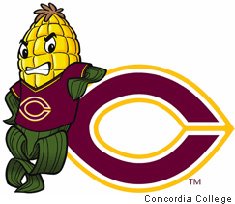 |
| Go, Cobbers, go! |
• the Cobbers of Concordia College in Minnesota. Take a look at the team logo to the right and you’ll see where the nickname comes from. That is, if you know a cob of corn when you see one.
• The Dirtbags of California State University-Long Beach. I’m serious. The Dirtbags! (Those nutty Californians again.) The school’s official nickname is “49ers,” but the university proudly calls its baseball team, in particular, “dirtbags” because of its gritty style of play.
• The Dust Devils of Texas A&M International. A dust devil is a miniature whirlwind that skips across a parched prairie.
• The Ephs of Williams College in Massachusetts. The college was founded in 1793 by Col. Ephraim Williams. The players are “Ephs,” pronounced “effs,” but the school’s sports mascot is a purple cow! Go figure.
• The Fire Ants of the University of South Carolina-Sumter. I’d pay to see the Fire Ants face the Black Flies.
• Three colleges have chosen “Flying Dutchmen” as their nickname, and one picked “Flying Fleet.” And the women’s basketball team at Wayland Baptist College in Texas is the “Flying Queens.”
• Then there are the Frogs of Hampshire College in Massachusetts. Not Horned Frogs or Croakin’ Frogs or Killer Frogs. Just plain old Frogs.
• The Gamecocks of the University of South Carolina. These are more chickens. Mean ones, bred for fighting.
• the Gauchos of the University of California-Santa Barbara. Gauchos are South American cowboys. The campaign for this nickname back in 1936 was led by women on campus who had thrilled to “The Gaucho” movie, starring the dashing Douglas Fairbanks.
• the Gentlemen of Centenary College in Louisiana
• the Golden Gusties of Gustavas Adophus University in Minnesota
I could go on and on — and will!
• the Golden Hurricane — just one hurricane — of Tulsa University in Oklahoma
• the Gryphons of Sarah Lawrence College on New York’s Long Island. Often perched in stone high on castles and the like, a gryphon is a winged monster with the head of an eagle and the body of a lion.
• the Gyrenes of Ave Maria University in Florida. Gyrene is one of the nicknames for U.S. Marines. It’s a curious choice for a Roman Catholic school — not that there aren’t Catholic Marines.
• the Harriers of Miami University-Hamilton in Ohio. A harrier is a pesky hawk or anything that “harries” or harasses its prey.
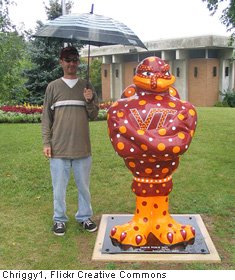 |
| This is one of a series of “Hokie birds” in Blacksburg, home of Virginia Tech. It’s a turkey because an older, alternate school nickname is “the Gobblers” |
• the aforementioned Hokies of Virginia Tech. The name was appropriated from a “spirit yell” that begins, “Hoki, Hoki, Hoki, Hy.” This makes sense only in Blacksburg, Virginia, and “Hokie Nation.”
• the Humpback Whales of the University of Alaska-Southeast
• the Hustlin’ Quakers of Earlham College in Indiana. There’s something strange about the imagery here.
• the Ichabods of Washburn University in Kansas. The name did not derive from author Washington Irving’s fictional character who was pursued by a headless horseman. Ichabod Washburn was the school’s founding patron.
• the Jaspers of Manhattan College, which is in the Bronx despite the college’s name. The nickname comes from a Brother Jasper, who was the team’s first baseball coach in the 19th Century.
• the Javelinas of Texas A&M-Kingsville. A javelina is gray peccary with a white “collar.” And what’s a peccary? It’s a really ugly, grouchy, and stinky pig-like creature with razor-sharp tusks.
• the Jennies of Central Missouri State. A jenny is a female mule.
• the Jimmies of Jamestown College in North Dakota. Nobody in the town, which is bisected by the James River, can seem to pinpoint who adapted the nickname for “James” to the college, or why, by Jiminy, it’s not spelled the usual “Jimmy.”
• the Judges of Brandeis University in Massachusetts
• the Keelhaulers of California Maritime Academy. These athletes must be nigh unto sadistic, since keelhauling was one of the most brutal forms of corporal punishment inflicted upon sailors. The miscreant was dragged through the water under a ship’s keel, often across razor-sharp, flesh-flaying barnacles that clung there.
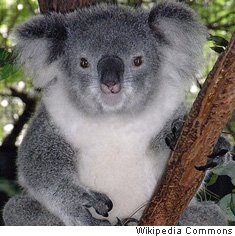 |
| Who needs a mascot suit when your nickname namesake is this cuddly? |
• the Koalas of Columbia College in South Carolina. Koalas are bear-looking cuties — though they’re not bears — that you see in Australian travel posters, placidly munching on eucalyptus leaves.
• the Ladies of Centenary College. Hey, Centenary’s male athletes are “Gentlemen” (at least in name) so of course . . .
• the Lemmings of Bryant & Stratton College in Ohio. Lemmings are Arctic rodents with a weird reputation. They’re said to commit mass suicide by jumping off cliffs. That’s bunk, and it’s hardly heroic imagery for a sports team!
• the Lobos of the University of New Mexico and Sul Ross State in Texas. Lobos are gray wolves.
• the Lord Jeffs of Amherst College in Massachusetts. The college is named for its town, and the town is named for British general Jeffrey Amherst, who dashed about British Canada more than the lower colonies prior to the American Revolution.
• the Lumberjills of Northland College in Wisconsin. The men’s players are “Lumberjacks.” Get it?
• the Lutes of Pacific Lutheran in Washington State. These aren’t musical instruments. “Lute” is sort of shorthand, with a Scandanavian accent, for Lutheran.
• the Magicians of Lemoyne-Owen in Tennessee
• the Mastodons of Indiana University-Purdue University-Fort Wayne
• the Medics of Thomas Jefferson University in Pennsylvania
• the Minutemen — and, yes, Minutewomen — of the University of Massachusetts. Minutemen were American colonial militiamen.
• the Mounties of Mount Aloysius College in Pennsylvania
• the Nads of Rhode Island School of Design. This one’s a bit risqué, but if it’s clean enough for the school’s official Web site, it’s clean enough for me. The name is taken from a cheer, particularly for the school’s rugged hockey team: “Go, Nads!” I’ll let you piece it together.
• the Nor’Easters of the University of New England in Maine. A Nor’Easter is a fierce storm whose winds from the northeast off the Atlantic Ocean pummel the New England coast.
• the Paladins of Furman University in South Carolina. A paladin is someone who champions another’s cause. The originals were warriors in the court of the Frankish king Charlemagne, emperor of the Holy Roman Empire.
• the Penmen of Southern New Hampshire University. In a “pen is mightier than the sword” metaphor, “Penmen” was designed to evoke New England colonials’ courageous use of the quill.
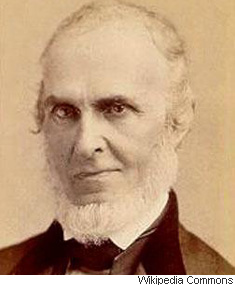 |
| You can see why Whittier College uses a cartoon fellow in a colonial hat as its logo rather than trying to make something out of John Greenleaf Whittier’s mug |
• the Poets of Whittier College in California. Get it? Whittier. Poets.
• the Polar Bears of Ohio Northern and of Bowdoin College in Maine
• the Pomeroys of Saint Mary-of-the-Woods in Indiana. This nickname is taken from a onetime sports-loving faculty member, Sister Mary Joseph Pomeroy.
• the Professors of Rowan University in New Jersey. I’ve heard of buttering up the faculty, but please!
• the Radicals of Antioch College in Ohio. Check out the school’s history and reputation in the link, and you’ll understand.
• the Ragin’ Cajuns of Louisiana-Lafayette. “Cajun” is short for the French-speaking Acadian people who fled Quebec in Canada and settled on the Louisiana coast.
• the Railsplitterrs of Lincoln Memorial University in Tennessee. Refer to Abe Lincoln’s bio for this one.
• the Rambelles women’s teams at Angelo State in Texas. The men are “Ramblers.”
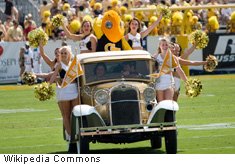 |
| Georgia Tech’s yellowjacket mascot and some winsome cheerleaders make their entrance in a Ramblin’ Wreck that actually looks to be in decent shape |
• the Ramblin’ Wreck of Georgia Tech. That comes from the team’s fight song. In it, the original wreck was not an automobile or train. It was a drunken — e.g., “wrecked” — engineering student!
• the Razorbacks of the University of Arkansas. A razorback is another wild hog with an irritable disposition.
• the Reddies of Henderson State in Arkansas. The original “Red Jackets” sports nickname was gradually modified to “Reds” and then “Reddies,” probably because no one could think of anything to rhyme with “Red Jackets” in a pep yell.
• the Retrievers of the University of Maryland-Baltimore County. Not all states have “state dogs,” but Maryland does. It’s the Chesapeake Bay retriever. This university’s version even has a name: “True Grit.”
• Six colleges call their sports teams “Roadrunners,” after darting little ground birds. You knew that if you’ve seen the Roadrunner cartoon films in which the bird utters an insolent “meep-meep” as it zips past the clutches of hapless Wile E. Coyote.
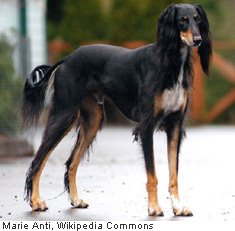 |
| The saluki looks like it’s bred for speed, all right |
• the Salukis of Southern Illinois University. A saluki, or gazelle hound, is a swift hunting dog, similar to a greyhound, that originated in Egypt.
• the Sea Aggies of Texas A&M-Galveston. Students and graduates from colleges with an agriculture emphasis are called “aggies.” And Galveston is on a sea — the Gulf of Mexico.
• the Shockers of Wichita State in Kansas. Out in wheat country, a shock is a bundle of cut grain of the sort that you see on coins and state seals.
• the Sooners of the University of Oklahoma. During an organized rush into unassigned federal land in what is now Oklahoma in 1889, some people jumped the gun and grabbed the choicest homesteading spots. They got there “sooner” than those who followed the rules.
• the Spires of the University of Saint Mary in Kansas. When the previously all-women’s school began accepting men and playing sports in 1988, it needed a nickname. “Spires” honored a prominent campus tower and the idea of aspiring to lofty things.
• the Stormy Petrels of Oglethorpe University in Georgia. Now there’s a rival for “Banana Slugs” when it comes to originality. A petrel is a sea bird that flies so low, it looks like it’s walking on water. In a windstorm, it ducks into the lee of a ship.
• the Stumpies of the State University of New York-College of Environmental Science and Forestry. Forests. Stumps. Now it’s time to chop the name of the school.
• the Tars of Rollins College in Florida. “Tar,” or “jack-tar,” was an early name for sailors. It may relate to tarpaulin cloths, impregnated with tar, that are common aboard ships.
• the Toreros of the University of San Diego in California. A torero is a matador or one of his supporters in a bullfight.
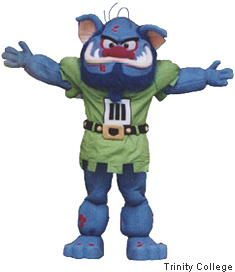 |
| Trinity’s Troll is a mascot of which children’s nightmares are made |
• the Trolls of Trinity College in Illinois. This, too, is an unusual nickname for a Christian school, since, in Nordic fairy tales, a troll is a scary, definitely irreligious figure that lurks in caves or under bridges.
• the Vandals of the University of Idaho. These aren’t punks who trash property or scrawl graffiti. They are the namesake of Fifth Century nomadic hordes who made a name for themselves by sacking Rome.
• the Vixens of Sweet Briar College in Virginia
• the Wasps of Emory and Henry in Virginia
• the Women of Troy women’s teams at the University of Southern California. The men, natch, are “Trojans.”
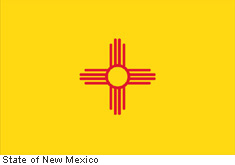 |
| The New Mexico zia sunburst |
• and the Zias women’s squads at Eastern New Mexico (the men are “Greyhounds”). The zia is the sunburst symbol on the New Mexico state flag. Taken from the American Indian pueblo dwellers of the same name, the zia’s four radiants have several meanings, including stages of life.
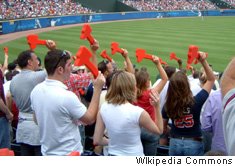 |
| At least there wouldn’t be any offensive “tomahawk chops” associated with a lovable green vegetable mascot |
I’ve ignored the abundant and unimaginative Lions, Tigers, Bulldogs, and Cougars, and annoying weather phenomena like “Thunder” and “Fire.” It’s hard to pick a favorite from the list above. “Banana Slugs” wins on audacity, but “Stumpies” sort of works for me.
I’m withholding a vote, though, in hopes that the brave men and women of William & Mary rally behind the “Fightin’ Asparagus Stalks”!
(These are a few of the words from this posting that you may not know. Each time, I’ll tell you a little about them and also place them into a cumulative archive of “Ted’s Wild Words” in the right-hand column of the home page. Just click on it there, and if there’s another word in today’s blog that you’d like me to explain, just ask!)
Audacity. Daring, of the kind where you find yourself saying, “Of all the nerve!”
Bunk. Patently false information, akin to “hogwash” or bull excrement.
Capitulate. To surrender under agreed-upon terms, usually after a long and honorable struggle.
Hapless. Pathetic, deserving of pity.
Intractable. Not easily convinced, managed, or fixed.








